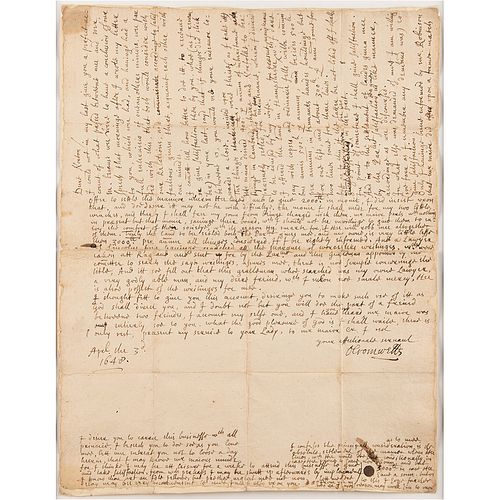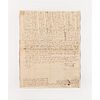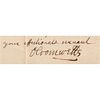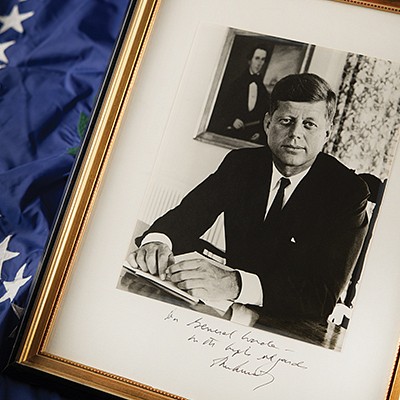Oliver Cromwell Autograph Letter Signed on the Marriage of His Son, Richard Cromwell
Two ways to bid:
- Leave a max absentee bid and the platform will bid on your behalf up to your maximum bid during the live auction.
- Bid live during the auction and your bids will be submitted real-time to the auctioneer.
Bid Increments
| Price | Bid Increment |
|---|---|
| $0 | $5 |
| $50 | $10 |
| $200 | $25 |
| $500 | $50 |
About Auction
May 15, 2024
Boasting nearly 800 lots, RR Auction's May Fine Autographs and Artifacts sale is highlighted by a section honoring the anniversary of President John F. Kennedy's birth—including important signed photographs, a remarkable Kennedy family-signed book, a knife used to slice his inaugural cake, a page from his pioneering Peace Corps legislation, and scarce teletype reports on his assassination. RR Auction support@rrauction.com
- Lot Description
ALS signed “O. Cromwell,” two pages on two adjoining sheets, unfolded to 15.75 x 12, April 3, 1648. Large, lengthy handwritten letter to Colonel Richard Norton, aiming to expedite the negotiations for the marriage of his son, Richard Cromwell, to Dorothy Maijor, the daughter of Richard Maijor, a member of the Hampshire gentry. In part: "I could not in my last give you a perfect account of what passed between me and Mr. M[aijor] because we were to have a conclusion of our speed that morning after I wrote my letter to you. Which we had, and having had a full interview of one another's minds, we parted with this, that both would consider with our relations, and according to satisfactions given there, acquaint each other with our minds...
The things insisted upon were these (as I take it). Mr. Maijor desired 400l. per annum of inheritance, lying in Cambridgeshire and Norfolk, to be presently settled, and to be for maintenance, wherein I desired to be advised by my wife. I offered the Land in Hampshire for present maintenance which I dare say with copses and ordinary fells will be communibus annis, 500l. per annum, besides 500l. per annum, in tenants hands holding but for one life, and about 300l. per annum, some for two lives, some for three lives...For what else was demanded of me I am willing (so far as I remember any demand was) to give satisfaction.
Only, I having been informed by Mr. Robinson that Mr. Maijor did, upon a former match, offer to settle the Manor wherein he lived, and to give 2,000l. in money, I did insist upon that, and do desire it may not be with difficulty. The money I shall need for my two little wenches, and thereby I shall free my Son from being charged with them. Mr. Maijor parts with nothing in present but that money, saving this board which I should not be unwilling to give them to enjoy the comfort of their society, which it's reason be smart for, if he will rob me altogether of them. Truly the land to be settled both what the Parliament gives me, and my own, is very little less than 3,000l. per annum, all things considered, if I be rightly informed. And a Lawyer of Lincoln's Inn having searched all the Marquis of Worcester's writings, which were taken at Ragland and sent for by the Parliament, and this gentleman appointed by the Committee to search the said writings, assures me, there is no scruple concerning the title, And it so fell out that this Gentleman who searched was my own Lawyer, a very godly able man, and my dear friend, which I reckon no small mercy, He is also possessed of the writings for me. I thought fit to give you this account, desiring you to make such use of it as God shall direct you, and I doubt not but you will do the part of a friend between two friends. I account myself one, and I have heard you say Mr. Maijor was entirely so to you."
He adds a postscript: "I desire you to carry this business with all privacy, I beseech you to do so as you love me. Let me entreat you not to lose a day herein, that I may know Mr. Maijor's mind, for I think I may be at leisure for a week to attend this business, to give and take satisfaction, from which perhaps I may be shut up afterwards by employment. I know thou art an idle fellow, but prithee neglect me not now delay may be very inconvenient to me, I much rely upon you. Let me hear from you in two or 3 days. I confess the principal consideration as to me is the absolute settlement of the Manor where he lives, which he would not do but conditionally in case they have a son, and but 3,000l. in case they have no son. But as to this, I hope farther reason may work him to more." Nicely corner-mounted and matted to an overall size of 16.75 x 20.25. Professionally backed and in fine condition.
This letter is significant for its date—April 3, 1648, as the Second English Civil War was brewing—and for its fascinating details regarding lands, inheritances and potential offspring. According to Cromwell's biographer Samuel Church in 'Oliver Cromwell, a History,' the choice of companion for his son revealed Cromwell's character: 'Had Oliver at this time cherished the bold schemes for dominion which his enemies impute to him, he would never have sought this obscure alliance with the daughter of a country gentleman.' The marriage was concluded in 1649, and Richard Cromwell would succeed his father as second Lord Protector a decade later. - Shipping Info
-
Bidder is liable for shipping and handling and providing accurate information as to shipping or delivery locations and arranging for such. RR Auction is unable to combine purchases from other auctions or affiliates into one package for shipping purposes. Lots won will be shipped in a commercially reasonable time after payment in good funds for the merchandise and the shipping fees are received or credit extended, except when third-party shipment occurs. Bidder agrees that service and handling charges related to shipping items which are not pre-paid may be charged to a credit card on file with RR Auction. Successful international Bidders shall provide written shipping instructions, including specified Customs declarations, to RR Auction for any lots to be delivered outside of the United States. NOTE: Declaration value shall be the item’(s) hammer price and RR Auction shall use the correct harmonized code for the lot. Domestic Bidders on lots designated for third-party shipment must designate the common carrier, accept risk of loss, and prepay shipping costs.
-
- Buyer's Premium



 EUR
EUR CAD
CAD AUD
AUD GBP
GBP MXN
MXN HKD
HKD CNY
CNY MYR
MYR SEK
SEK SGD
SGD CHF
CHF THB
THB





